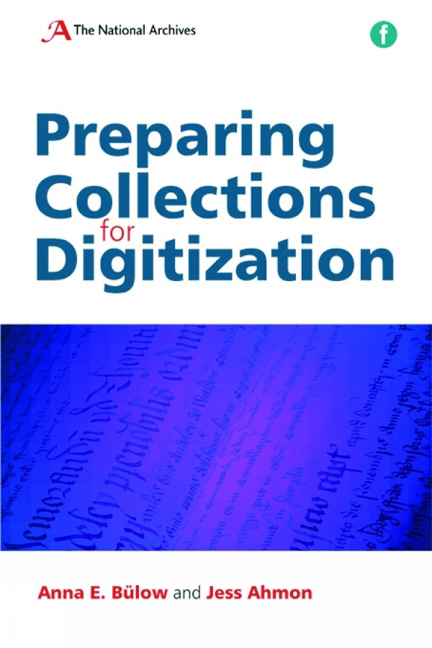Book contents
- Frontmatter
- Contents
- Acknowledgements
- List of figures and tables
- Introduction
- 1 Digitization in the context of collection management
- 2 Before you digitize: resources, suppliers and surrogates
- 3 The digital image Ross Spencer
- 4 The process of selection
- 5 Surveying collections
- 6 Equipment for image capture
- 7 Preparation of document formats and fastenings
- 8 Preparation of damaged documents
- 9 Setting up the imaging operation
- Conclusion
- Further reading
- Index
1 - Digitization in the context of collection management
Published online by Cambridge University Press: 08 June 2018
- Frontmatter
- Contents
- Acknowledgements
- List of figures and tables
- Introduction
- 1 Digitization in the context of collection management
- 2 Before you digitize: resources, suppliers and surrogates
- 3 The digital image Ross Spencer
- 4 The process of selection
- 5 Surveying collections
- 6 Equipment for image capture
- 7 Preparation of document formats and fastenings
- 8 Preparation of damaged documents
- 9 Setting up the imaging operation
- Conclusion
- Further reading
- Index
Summary
Introduction
Digitization projects take place within the context of a global market and institutional goals. The dramatic growth in digitization since the late 1990s is a direct response to the rapid development of the internet and corresponding changes in user expectations. This is part of an overall shift within the heritage sector as a whole and has had an inevitable impact on the way that collections are managed, and the role of the conservator.
The impact of new technologies
The internet has become the principle source of information on many aspects of life for millions of people of all generations. This digital revolution has fundamentally changed the way that we live and work. While there are great benefits to the availability of information via the internet, it has put new pressures on libraries, archives and museums. Increasingly, people expect to find and retrieve information online, especially the generation who have grown up with the internet and have often not learned to use and interrogate catalogues. Research using catalogue information typically leads to focused exploration of a subject in a particular context. In contrast, the internet works on a keyword search basis. Search results via keywords on the internet are vast, and the enormity of information thrown up often leads to an assumption that information not available on the internet is nonexistent. The growth of the internet has therefore fostered a new generation of users who not only expect all information to be available online but also expect it to be fully searchable.
At the same time, new technologies have brought new opportunities for cultural institutions – many libraries and archives have been involved with digitizing their collections for some years now. Digitizing collections has a great number of benefits, many of which go beyond the most obvious of increasing the general accessibility of a collection (Hughes, 2004, 9–16). Making a collection available online will facilitate access to it for a much broader audience. This can result in a shift from traditional users, such as academic researchers coming to use original material within an institution's reading room, to a much broader and more diverse user-base who will discover and subsequently use information that did not previously seem available to them.
- Type
- Chapter
- Information
- Preparing Collections for Digitization , pp. 1 - 16Publisher: FacetPrint publication year: 2010



